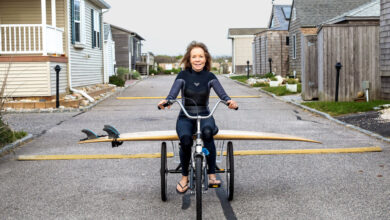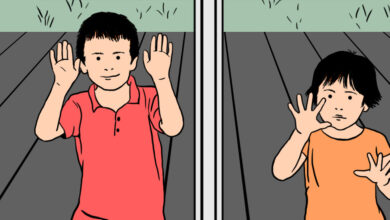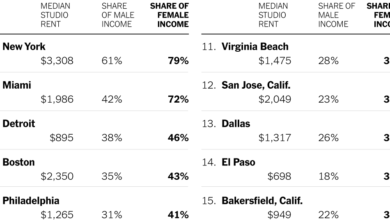Real Estate Industry Lags Behind the #MeToo Movement

[ad_1]
Sara Ghodsi sold auto parts before moving to San Diego and becoming a real estate agent. She didn’t have to sit in an office all day, made a good income and had the freedom to work on her own schedule, all of which she enjoyed.
But Ms. Ghodsi also understood it was a very competitive field as the number of agents across the country swelled to a record high. So when a homeowner in the coastal town of Oceanside, Calif., called and said he would consider selling, Ms. Ghodsi, eager to find a property for her client during the pandemic, agreed to meet him at his condominium — alone.
As they talked that afternoon in August 2021, the man began inching his chair closer to hers. Then he reached out, groped her thigh and forcefully kissed her.
“I kind of blacked out a little,” said Ms. Ghodsi, 37. “I was trying to be calm and collected because I was by myself in a stranger’s house. The door was maybe five feet away, but I had no idea what this guy was capable of doing.”
Across the nation, the overwhelming majority of real estate agents are women — and they are vulnerable to abuse in an industry that offers few protections, demands that they meet clients alone in empty homes and encourages them to use their appearance to help bring in buyers. Reports of harassment and occasionally physical violence, including rape and even murder, highlight the risks they face.
The National Association of Realtors reports that 66 percent of their members are women. Many were attracted to the field for the same reasons as Ms. Ghodsi: flexible schedules, a workplace that’s almost entirely remote and a licensing process that can be completed in as little as a few weeks.
But the industry is also structured so that 90 percent of agents are not actually employees of the agencies they work with. They are independent contractors, which means they are not protected under Title VII — the federal law that prohibits discrimination and sexual harassment in the workplace.
It also means that many real estate agencies that rely on these agents for the vast majority of their income do not feel obligated — or even inclined — to offer them any kind of institutional protection or training. For most of the women out there, it is up to them to come up with safety strategies like sharing their location with a family member or friend, insisting on references before meeting a client — or even carrying a firearm for protection.
And so, nearly six years after the #MeToo movement ignited a global reckoning about sexual harassment and assault, hundreds of thousands of women across the country are working in an industry that resists new measures to protect the women in its ranks.
“That world is pretty much the wild, wild west,” said Kimberly Perlin, a complex trauma therapist in Towson, Md., who has treated several real estate agents who were sexually assaulted at work. “Anybody can call up and say they have money and want a house, including sexual predators. And in a house, you have an unattended space, and an inherent power balance, because the salesperson wants the sale and the buyer knows it.”
T.
The National Association of Realtors, a trade organization representing 1.5 members, has been resistant to require any sort of safety training of its members.
Classes in its Realtor safety program, which includes webinars on best practices for safety, remain optional. On the group’s website, the program makes safety a matter of personal precautions, advising agents to avoid showing houses after dark and always ensure that properties have reliable cellphone service.
“It’s hard to force people to take certain things,” said Tracy Kasper, president-elect of the National Association of Realtors, of safety training. “Could that become part of what we make mandatory? It could. Have we done it yet? No we haven’t.”
Agents say the solution requires industrywide buy-in, and some recommended universal background checks for buyers and making mandatory safety trainings a contingency for all brokerages’ memberships in trade organizations. Others suggested that female agents have an option to ask for an escort when client meetings feel unsafe, with their brokerages covering the cost.
Ms. Ghodsi began carrying a Taser gun after her encounter. She filed a police report, but declined to press charges against her aggressor. “I just wanted it on file,” she said, “so it’s on record.”
It continues to affect both her mental health and her career.
“I feel like I haven’t been able to do my job to my full potential like I was before, because I’m scared,” she said.
Younger agents, and those new to the profession, are not always aware of the dangers.
“I never thought about it when I was starting out,” said Rachel DiSalvo, 41, who has been selling homes in New York and New Jersey for 12 years. “I would meet strangers at vacant homes at night.”
She has faced both sexual harassment while on the job — buyers making innuendos or attempting to grope her — as well as violence. One seller, angry she hadn’t secured him a higher price, took out an ax in front of her and proceeded to attack the lawn sign that bore her picture.
“I didn’t know what to do so I just tried to keep calm,” she said of the incident. “He was screaming and yelling. In the industry, we call it a ‘mantrum’.”
Surveys by industry groups have found that harassment in the industry is commonplace, with most real estate agents reporting that they had either personally experienced or witnessed sexual harassment in the workplace.
Working with house flippers, when homes sit vacant for prolonged periods, has also presented her with risks. In November, a squatter laid claim to a recently renovated home that she was trying to sell, and after she asked him to leave the property, he began calling her cellphone — the number was on the lawn’s “For Sale” sign — at all hours, threatening to have her killed.
She got the police involved, and eventually had him evicted from the property.
Ms. DiSalvo now has an alarm button on her phone and keeps pepper spray in her car, which she takes into properties whenever she feels uneasy. She always shares her live location with friends or family when going to showings. But she is aware of the industry’s Catch-22: Every time she asks a new client to provide identification before meeting, or refuses to set a meeting after dark, she knows they might just opt to go with another agent.
“We don’t have an HR department,” she said. “If someone does harass you, and you complain about it, you basically lose the opportunity to make that commission.”
Ms. DiSalvo is an independent contractor currently working with a Keller Williams brokerage in New Jersey. She notifies the brokerage every time she faces an uncomfortable incident. That follows protocol.
“Keller Williams’ policies and guidelines encourage employees and agents who believe they have been harassed in the workplace to promptly report those facts to their franchisee’s management,” said Darryl Frost, a spokesman for Keller Williams, who added that management is also required to investigate. But while Ms. DiSalvo has always felt that she receives a sensitive ear, little action follows.
After the squatter threatened her, she was left on her own to coordinate with the police. And at a previous brokerage, it was suggested a male colleague step in to close a deal after she was verbally harassed by the client. But that meant Ms. DiSalvo paid the male agent a referral fee out of her own commission.
“There is no scenario in which the brokerage gets involved unless the police report comes to them directly,” she said. “In 12 years, I have always been the one problem-solving in these scenarios.”
Agents also know that their physical appearance is linked to their success.
One need only watch an episode of “Selling Sunset,” Netflix’s hit reality show following a group of high-earning female agents, to get the connection: the higher the hemlines and the stilettos, it seems the higher the commissions, as well. Real estate agents use headshots to bring in business, because they know their physical appearance is part of their brand.
“It’s really a double-edged sword because as a Realtor, you have to look good, be nice, and sometimes flirt with everybody to make them trust you. But that shouldn’t make me a target,” said Ms. Ghodsi.
Yet the very nature of their jobs — often meeting strangers to woo them into buying property — exposes real estate agents to danger. Those in the industry are well aware of high profile murders: One agent was killed showing a million-dollar home in 2008 in British Columbia; another was gunned down outside a property she was showing in Florida last year. In 2021 alone, 25 real estate professionals died from violence on the job, according to the U.S. Bureau of Labor Statistics.
Perhaps no crime sent more shock waves through the industry than the death of Beverly Carter.
Ms. Carter had just one more property to show on that September day before she could go home.
It was nearly 6 p.m., and the Arkansas real estate agent called her husband to tell him that she would be home for dinner before getting into her brown Cadillac and driving 30 minutes outside of Little Rock to show a home to a stranger.
She was never seen alive again.
Ms. Carter was 50 years old when she was murdered in 2014. Her killer, who lured her to the isolated property by pretending to be an interested buyer, kidnapped her, suffocated her and eventually buried her body in a shallow grave nearby. He later told reporters that he targeted Ms. Carter because — like most real estate agents — “she was a woman working alone.” He was sentenced to life in prison; his wife, who served as an accomplice, received a 30-year sentence.
Her son, Carl Carter, remembers being woken by the doorbell at 4 a.m. on the Tuesday detectives found her body. She had been missing for four days and a group of his mother’s colleagues, knowing that media was already camped out at the concrete plant where her body was discovered, came to his home to break the news to him personally.
“The industry is operating without guardrails,” he said.
In 2017 he began the Beverly Carter Foundation, a nonprofit dedicated to creating more stringent safety measures for real estate agents. The same year, he and his family filed a lawsuit against Crye-Leike Realtors, the agency for which Ms. Carter had been working as an independent contractor, alleging the firm was aware of the dangers she faced but never offered any training or safeguards to prevent them. That suit was later dismissed because of the statute of limitations.
“No comment is needed,” said Harold Crye, president of Crye-Leike, in an email when contacted by a reporter about the case.
Too much onus is on individual agents to create their own safety measures, Mr. Carter said, when what is needed is industrywide reform. Rather than put protocols in place that would protect agents in the field, brokerages have been slow to respond to calls for broader reform — or resistant all together, Mr. Carter said.
“I’ve been told by big-name brokerages: ‘Sorry about your mom. But I’m not here to keep people safe, I’m here to make money,’” he said. “It’s just very much a for-profit industry.” The National Association of Realtors has made other trainings mandatory in the past: in May, after mounting pressure over discriminatory practices and appraisal bias, the organization announced that agents must now take regular continuing education classes in fair housing and diversity, equity and inclusion.
On the group’s webpage, they offer safety strategy tips like “share your schedule with a colleague, assistant or family member”; “check your cellphone battery and signal before heading to an appointment”’ and “never go into attics, crawl spaces or garages where you could be trapped.”
The organization also conducts an annual survey on safety. This year, when agents were asked if they’d been a victim of a crime while on the job, 98 percent of respondents said no. While the organization has touted those numbers as a success, Mr. Carter views them differently.
“A few percentage points out of 1.5 million suddenly becomes a really different conversation when you realize it means thousands of people have been victimized,” Mr. Carter said.
Some female agents, concerned about their own personal safety, are choosing to carry handguns on the job.
Dawna Hetzler, 53, began carrying a gun on the job years ago after a friend encouraged her to get tactical training and a concealed weapon permit because she worked alone so often.
She was still arranging brochures at an open house in the Denver suburbs in August 2019 when she heard a knock at the door. The tall man with a shaved head who stood outside said he was interested in potentially buying the townhouse she was showing. She let him in, and when he asked to see the upstairs, she led him to the primary bedroom.
Then he suddenly pulled up his shirt, revealing a 12-inch knife tucked into his pants. He also reached for a canister of bear spray and doused her in the face. But that day, she had her Springfield 9-millimeter gun hidden in an ankle holster beneath her pants leg. She fired one shot, and he fled.
“He brought a knife to a gunfight,” she said.
Her attacker was arrested four days later, and later sentenced to 16 years in prison.
Ms. Hetzler now offers trainings to other real estate agents, some of which involve tactical skills including headlocks as well as how to handle a gun during an attack. But carrying a weapon, she said, is a deeply personal decision.
“If you don’t believe in firearms, it doesn’t matter to me, there’s no judgment. Just find another way to defend yourself,” she said. “Nothing is worth your life, including a sale.”
Susan C. Beachy contributed research.
[ad_2]
Source link






